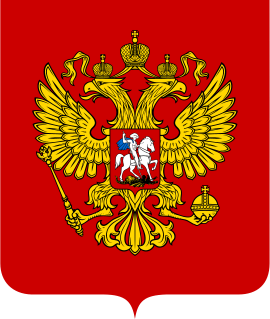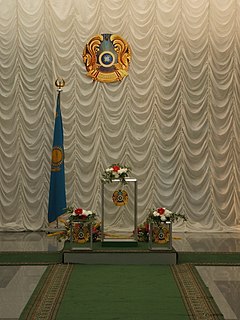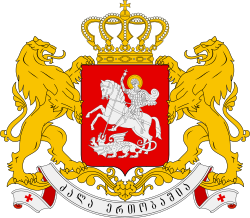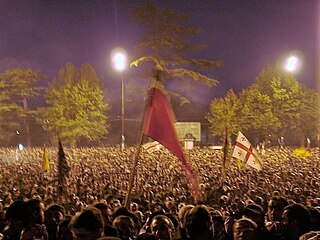
Mikheil Saakashvili is a Georgian and Ukrainian politician. He was the third President of Georgia for two consecutive terms from 25 January 2004 to 17 November 2013. From May 2015 until November 2016, Saakashvili was the Governor of Ukraine's Odessa Oblast. He is the founder and former chairman of the United National Movement party.

Nino Burjanadze is a Georgian politician and lawyer who served as Chairperson of the Parliament of Georgia from November 2001 to June 2008. As the first woman she has served as the acting head of state of Georgia twice; the first time from 23 November 2003 to 25 January 2004 in the wake of Eduard Shevardnadze's resignation during the Rose Revolution, and again from 25 November 2007 to 20 January 2008, when Mikheil Saakashvili stepped down to rerun in the early presidential elections. She withdrew into opposition to Saakashvili as the leader of the Democratic Movement-United Georgia party in 2008. In October 2013, she ran for president in the October 2013 election. She ran against 22 candidates and ended third with 10 percent of the vote.

Zurab Zhvania was a Georgian politician, who served as Prime Minister of Georgia and Speaker of the Parliament of Georgia. Zhvania began his political career at young age, making his first political steps as a member of Green Party, in the beginning of 90s. In 1992 Zhvania was elected chairman of Eastern European Green's and was first Eastern European to serve at the post. In 1993 Zhvania made first serious steps in Georgian politics as he was elected as General Secretary of Citizen's Union. From that point Zhvania served important role in Georgian politics until his death in 2005. 1995 he became the chairman of parliament and maintained the post till his resignation in 1999, which was followed with discharge of other ministers, whom Zhvania suspected in Corruption. From 1993 till 2003 Zhvania remained in opposition fighting against Shevardandze's government. In 2003, Zhvania united with other opposition leaders, mainly Burdjanadze and Saakashvili, held non-violent protests against the government. Protests ended with resignation of Shevardnadze and election of Saakashvili as the president. Zhvania became prime minister and served the post until his death in 2005.

On the federal level, Russia elects a president as head of state and a legislature, one of the two chambers of the Federal Assembly. The president is elected for, at most, two consecutive six-year terms by the people. The Federal Assembly has two chambers. The State Duma has 450 members, elected for five-year terms, using a system of proportional representation, where parties gain a percentage of seats equal to the percentage of national votes they gained, with a 7% threshold required to gain any seats in the Duma. The Federation Council is not directly elected; each of the 85 federal subjects of Russia sends 2 delegates to the Federal Council, for a total of 170 members.

A presidential election was held in the Republic of Georgia on January 4, 2004. The election followed the resignation of former President Eduard Shevardnadze. As expected, the main opposition leader, Mikhail Saakashvili, was soon shown by exit polls to be heading for an overwhelming victory. According to preliminary results issued on January 6 by Georgia's Central Election Commission, Saakashvili won over 97% of the votes cast.

United National Movement is the opposition political party in the nation of Georgia.

The Union of Citizens of Georgia was a centre-left political party established by Eduard Shevardnadze, President of Georgia from 1992–2003 and David Chantladze, former General Trade Representative of the Soviet Union to Czechoslovakia. It was established in the mid-1990s as a vehicle for modernising politicians. It became the majority grouping in the Georgian parliament following the parliamentary elections of November 1995, with Shevardnadze winning the presidency at the same time.

Legislative elections were held in the Georgia on 28 March 2004. The elections followed the annulment of the November 2003 legislative elections, which were widely believed to have been rigged by the former President, Eduard Shevardnadze. New elections were ordered following the resignation of Shevardnadze and the election of President Mikhail Saakashvili in January 2004.

Elections in Kazakhstan are held on a national level to elect a President and the Parliament, which is divided into two bodies, the Majilis and the Senate. Local elections for maslikhats are held every five years.

Zurab Noghaideli is a Georgian businessman and a politician who served as the Prime Minister of Georgia from February 2005 until he resigned, citing health problems, on 16 November 2007. In December 2008, Noghaideli withdrew into opposition, setting up the Movement for Fair Georgia party.

Legislative elections were held in the Russian Federation on 2 December 2007. At stake were the 450 seats in the 5th State Duma, the lower house of the Federal Assembly of Russia. Eleven parties were included in the ballot, including Russia's largest party, United Russia, which was supported by President of Russia Vladimir Putin. Official results showed that United Russia won 64.3% of the votes, the Communist Party of the Russian Federation 11.6%, the Liberal Democratic Party of Russia 8.1%, and Fair Russia won 7.7%, and none of the other parties won enough votes to gain any seats.

Parliamentary elections were held in Georgia on May 21, 2008. President Mikheil Saakashvili proposed a referendum on bringing them forward from October to April after the 2007 Georgian demonstrations. The referendum was held at the same time as the early presidential election on 5 January 2008; according to exit polls, voters were largely in favour of having the elections in spring.

Presidential elections were held in Georgia on 5 January 2008, moved forward from autumn 2008 by President Mikheil Saakashvili after the 2007 demonstrations.

The Republican Party of Georgia, commonly known as the Republicans, is a political party in Georgia active since 1978. Until March 2016, the party was a part of the Georgian Dream coalition that won the 2012 election, defeating the United National Movement.

The Ukrainian parliamentary election of 2012 took place on 28 October 2012. Because of various reasons, including the "impossibility of announcing election results" various by-elections have taken place since. Hence, several constituencies have been left unrepresented at various times.

The Georgian parliamentary election of 2012 was held on 1 October 2012 in Georgia. It was the 7th legislative election held since independence from the Soviet Union in 1991. The opposition Georgian Dream coalition of billionaire businessman Bidzina Ivanishvili won a majority of seats. President Mikheil Saakashvili conceded his party's loss.

Presidential elections were held in Georgia on 27 October 2013, the sixth presidential elections since the country's restoration of independence from the Soviet Union in 1991. The last elections in January 2008 resulted in the re-election of Mikheil Saakashvili for his second and final presidential term. Saakashvili was constitutionally barred from running for a third consecutive term.

Parliamentary elections were held in Afghanistan on Saturday 20 October 2018 to elect members of the House of the People. They had originally been scheduled for 15 October 2016, but were initially postponed to 7 July 2018, and then again to 20 October. Much of the prelude to the elections has focused on the debate over reforming the country's electoral laws. The current system is one of single non-transferable vote. Kandahar's election was held on October 27.

















